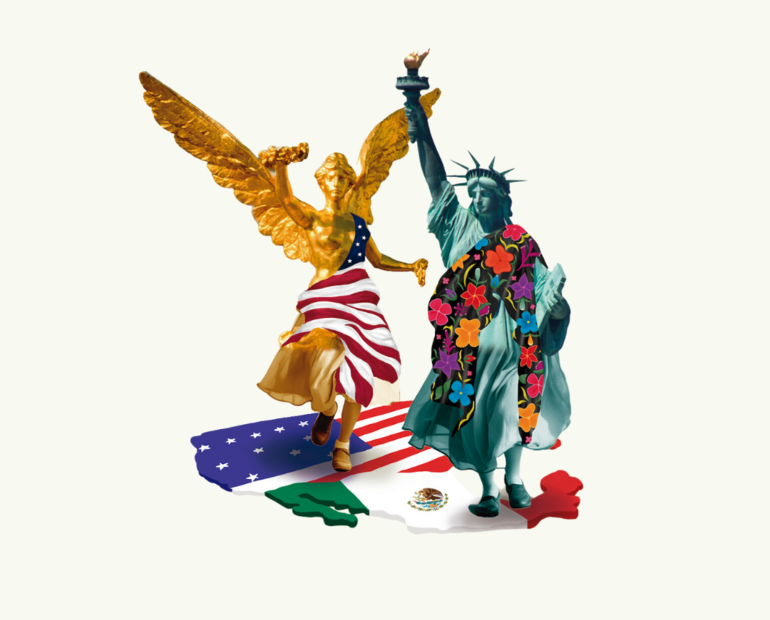
Event: Distant Neighbors or Regional Partners? Reflecting on US-Mexico Relations Under Two New Administrations. A Two-Day Symposium
Though the newly elected presidents of Mexico and the United States started their terms mere months apart, both signaled the importance of the border to their agenda. As Mexico’s first female president, Claudia Sheinbaum has voiced longstanding concerns about the border and U.S. overreach, as well as a range of issues and treaties — from NAFTA to water sharing to nearshoring and energy challenges. In the first weeks of his second term, Donald Trump’s swift imposition of tariffs, building of a holding camp for migrants at the border, and targeting Latin Americans for deportation seem to have set an agenda of aggression as opposed to diplomacy. What will the coming months and years bring to these two neighboring nations? We take these historic transitions as a starting point for reflecting on the nature and future of U.S.-Mexico relations, understood not just through policies and dialogues but also with a focus on the ways that bodies, resources, and ideas unite or divide the two nations. The conference features panelists from academia, public service, and the private sector, who share their views on these matters in a series of four panels, a curated luncheon discussion with mayors from border cities, and a keynote from a prominent journalist.
Date: March 27-28, 2025 Location: CGIS South, Tsai Auditorium
A two-day conference presented by the David Rockefeller Center for Latin American Studies at Harvard University, the Bloomberg Center for Cities at Harvard University, and the Department of the History of Science.
For details on the first day of programming, see here. For details on the second day of programming, see here.
We will update this page with images and recordings of the event once they become available.
Organized by:
Diane E. Davis, Charles Dyer Norton Professor of Regional Planning and Urbanism at Harvard University, has a distinguished career focusing on urban development and governance. Former Chair of Harvard’s Urban Planning and Design Department, she previously led MIT’s International Development Group. Davis’s expertise spans urban violence, governance, and sovereignty, with notable works including Urban Leviathan: Mexico City in the Twentieth Century and Discipline and Development: Middle Classes and Prosperity in East Asia and Latin America. She has secured fellowships from major foundations and recently led projects funded by Mexico’s INFONAVIT on sustainable social housing and by Volvo on urban transport. Davis is currently a CIFAR Fellow and Co-director of its Humanity’s Urban Future Program, which focuses on Mexico City among several other global cities. Davis is also Co-chair of the David Rockefeller Center’s Faculty Committee for the Mexico Studies Program.
Gabriela Soto Laveaga, Professor of the History of Science and Antonio Madero Professor for the Study of Mexico at Harvard University, specializes in modern Latin American history, in particular histories of science, medicine and technology. Her prize-winning research includes, Jungle Laboratories: Mexican Peasants, National Projects and the Making of the Pill, won the Robert K. Merton Prize, and recently an article on Octavio Paz in India and Mexican wheat seeds as exported technologies won LASA’s Mexico Section Best Article prize. In October 2024 she was elected to the Academia Mexicana de la Historia a singular honor for historians of Mexico, especially for those outside of the country. Some named honors include a fellowship from the Institute for Advanced Study at Princeton, the Dibner Distinguished Fellow at the Huntington Library, and most recently she was selected to deliver the Centennial lecture for the 100-year anniversary of the History of Science Society in Mérida. Her first museum exhibit, Measuring Difference, is currently on display at the CHSI gallery at Harvard University. Her book on Mexico’s agrotech impact on India is forthcoming in 2026. Soto Laveaga is Co-chair of the David Rockefeller Center’s Faculty Committee for the Mexico Studies Program and Chair of the Latinidad and Global Diasporas initiative.




